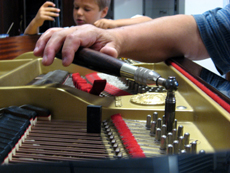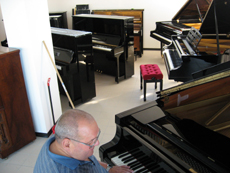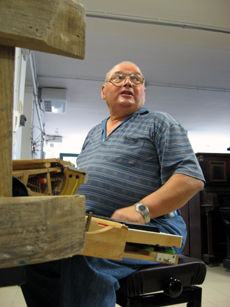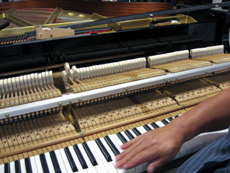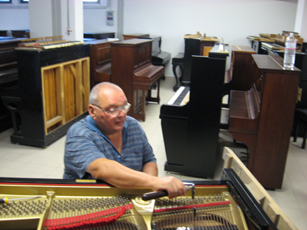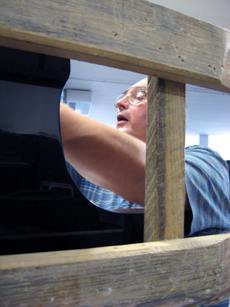|
Local piano restorer world-renowned |
|
||||||||||||
|
Bevilacqua, 71, is the founder and owner of the small, family-run business that restores pianos from all over the world. Bevilacqua’s blend of art and knowledge began at age 11 when
his father, a musician and employee of Camerano’s Farfisa
accordion factory, taught him how to restore accordions. This ability
eventually enabled Bevilacqua to get a job with the company that
was once a leading manufacturer in the accordion industry.
|
Bevilacqua listens closely as he works on an older piano, using his ears and hands to guide him. He learned to play and work by ear when he was a boy. |
||||||||||||
| During the 1960s, Farfisa decided to begin producing pianos as well as accordions. Eleven people, including Bevilacqua, were sent to Germany and trained in the piano-making trade. Before long, he fell in love with the art of piano making and restoring. Bevilacqua started his own company, Piano Forte, in 1965, and credits his success to passion and ambition. “If you are passionate about something, it will not take long to learn how to do it,” Bevilacqua says. He has always been a piano technician, and says that is why he loves his work. The work begins with pianos that are imported from all over the world. Most come from Germany and Switzerland, but he has also recently worked with pianos from Japan. Each instrument varies in age, condition and size, and remains in a storeroom until the restoration is complete. Bevilacqua first disassembles the piano and begins with its mechanical problems. These problems can be anything from repairing rusted or broken strings to replacing the hammer or the wooden piece that strikes each note. Sometimes the entire piano is reconstructed by Bevilacqua. |
|||||||||||||
The craft is his life. |
After the technical restoration is complete, Bevilacqua begins the cosmetic work, which often requires the development and construction of completely new parts. Most of the wood he uses comes from Naples, and he often has to rebuild complete sections of the piano’s frame. After he revamps the look of the piano, Giulio Santini, Bevilacqua’s grandson, finishes it with a wax coating and brings it to the showroom for display and sale. Despite his success, Bevilacqua has never felt the desire to abandon his love for family or his belief that his business should stay in their hands. His wife, daughter, son and grandson are all crucial parts of Piano Forte. |
||||||||||||
|
The youngest family member, Giulio Santini, has expressed a desire to follow in his grandfather’s footsteps. At 7, he is already musically talented, but says that he does not want to be a musician. “I want to be like my grandfather,” Santini says. The grandson has already begun training for this craft, and Bevilacqua says he would be thrilled if he chooses to take over the business. Bevilacqua’s pianos are sold throughout Europe, but most of the company’s business comes from piano rental. He sells between 65 and 70 pianos a year, but his pianos are also rented by world-renowned musicians when they play in the Le Marche region. The most recent rental was by Ciammarughi, a classical musician who performed on July, 12, 2006, in Sant ‘ Elpidio a Mare, at an event dedicated to American poetry. Although the business has allowed Bevilacqua to earn a living
and a reputation as a craftsman of pianos, he stands firm in the
belief that it is only because he loves what he does that he has
been able to work for so long. “I love the job,” says
Bevilacqua, “If not, I would give up.” |
|||||||||||||
|
>>back
to top |
|||||||||||||
| Home | About Camerano Project | Contact Us Arts & Entertainment | Sports | Family & Faith | Commerce | Community Life | Index Copyright ©2006 The Institute for Education in International Media |
|||||||||||||

